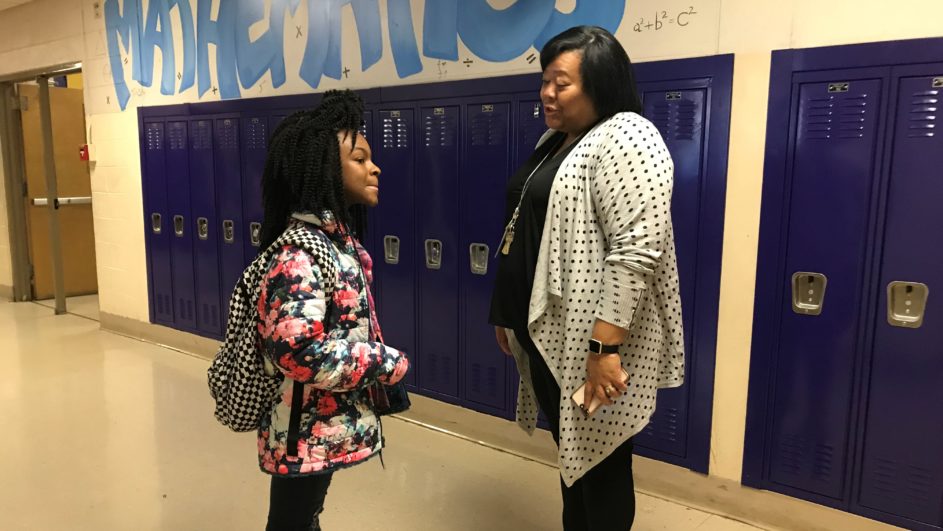As an eighth-grader at Vine Middle Magnet School, Jameiyes Mills has done plenty of reading during his academic career.
This year, though, he read a novel by Jason Reynolds called “Long Way Down,” and he said it was different. The story focuses on a teenager who is facing a tragedy, and Jameiyes said the twists and turns of the story ensured that “you wouldn’t get bored.”
“His brother got shot and killed and he was trying to think if he wanted to go and get revenge or just let the court deal with it,” he added.
Jameiyes isn’t the only student at Vine who enjoyed the novel. The entire eighth-grade class read “Long Way Down” as part of a broader initiative aimed at fostering community and connectedness.
This year, the school added a daily, 30-minute advisory period that focuses on a specific topic every day, including goal-setting and career exploration on Mondays; a class service project on Wednesdays called Golden Bear Good Works; and the “grade-wide reads” on Thursdays.
“We know that one of the biggest factors in the classroom is relationships with our students,” said Sarah Shanks, a behavior coach at Vine who helped create the advisory system. “We wanted to provide some time for teachers to build those relationships … Advisory mostly is about building relationships with kids, so that every student in the building has an adult that they feel safe with, and going to, if anything ever happened or if they ever needed anything.”
The advisory groups are small, with only about 12 students in each group, and have a laid-back feel that aims to make students comfortable sharing ideas and talking about their experiences.
On a recent morning, several students in teacher John Fornadel’s advisory class had traded their desks for a more casual perch along the back wall, while Fornadel led a free-flowing conversation about how to prevent bullying at Vine.

Students at Vine Middle School measure a hallway bulletin board as part of a project to add inspirational quotes and new artwork in the hallways.
Across campus, students in Sarah Lyle’s advisory period were measuring bulletin boards, the first step in a project to decorate them with new artwork and inspirational sayings.
Vine principal Desiree Jones said promoting empathy was a major focus during the year’s first nine-week block, largely because students found the idea compelling. Jones said there has been a generational shift that has left many students less equipped to be empathetic, partly because they have fewer models.
“I attribute it maybe to screen time,” Jones said. “I was a kid in a book all the time, but I had to use my imagination and I had to empathize with the characters. There was no picture given to me.”
Shanks agreed, saying that as students spend time with digital devices, it’s easy to not think about the needs of people in the real world. “And the more screen time they’re getting, the less face-to-face time they’re talking to people, and getting ways to practice empathy that way.”
The grade-wide reads initiative – which saw sixth-graders read “March,” a graphic novel by civil-rights leader John Lewis, and seventh-graders read “Booked” by Kwame Alexander – also fits into a broader emphasis.
While KCS is a leader among Tennessee’s urban school systems when it comes to literacy, one of the district’s top priorities is to increase the percentage of students who are reading on grade level.
Angela Roberts, a librarian at Vine who has coordinated the grade-wide reads program, said the school tried to identify books that would have high interest among students and also be accessible.
That strategy has paid off. Roberts said students will beg her for copies of the books or for other books by the same authors and said sequels to the Lewis memoir have been checked out repeatedly.
“It’s helping us really create a culture of reading and literacy engagement in our school in a way that maybe hasn’t (been present) before,” she added.
The advisory curriculum was created by teachers at Vine, and Jones said it’s been exciting to see the school community buying in – even if students don’t like to show it.
“As is the nature of middle-schoolers, they may not want to admit when they like something, but we can tell when they do like something,” she said. “And I think they like the community that is being created.”
Josh Flory is a multi-media specialist with Knox County Schools and writes this blog, Hall Pass, for the KCS website.

